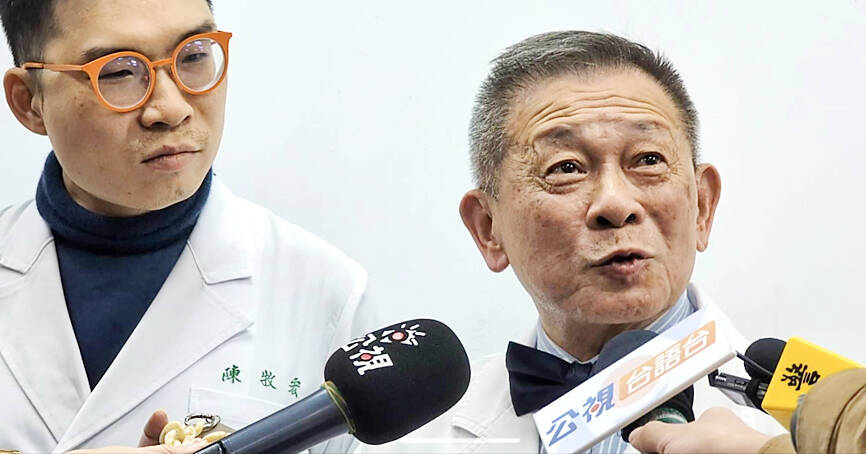Ketamine could reduce suicidal ideation for people diagnosed with treatment-resistant depression (TRD) if used in small controlled doses, Taiwanese researchers said on Thursday.
When taken in small doses, ketamine could act as an antidepressant in just a few hours, and could act as a “filler” medication to take alongside traditional medication prescribed to fight depression, Cheng Hsin General Hospital physician Su Tung-ping (蘇東平) told a news conference at the hospital when presenting their findings.
People who were part of a study presented in the paper were ranked according to Item 10 of the Montgomery-Asberg Depression Rating Scale (MADRS), with a 4 meaning “the person feels they’d be better off dead; suicidal thoughts common and considered as a possible solution, but no specific plans/intention,” and a 6 meaning “the person has explicit plans for suicide; active preparations,” Su said. The study recruited outpatients, comprised of 59 women and 20 men, who have TRD and prominent suicidal ideation, and randomized them into two groups to receive 0.5mg/kg of ketamine or 0.045mg/kg of Midazolam, Su said.

Photo: CNA
The study results support the use of rapid antidepressant and antisuicidal effects of low-dose ketamine infusion in people with TRD and prominent suicidal ideation, Su said.
The antidepressant effect of ketamine persisted for up to two weeks, but the antisuicidal effect lasted only five days, Su said.
Su said that the timing of ketamine treatment was crucial.
Patients with moderate or low treatment refractoriness or drug responsiveness, current depressive episodes that have persisted for less than 24 months, or less than or equal to four failed antidepressant treatments, might receive the greatest benefits from low-dose ketamine infusion, he said.
Cerebral tomography of patients before the use of ketamine showed low metabolization in the frontal lobe, which became more active after the injection of ketamine, Su said.
Some TRD patients might entertain suicidal thoughts from the moment they wake up every day, adding that this research could help inhibit such thoughts and make them “want to live,” Taipei Veterans General Hospital Department of Psychiatry physician Chen Mu-hong (陳牧宏) said.
Su also said that as only minute doses of ketamine were used on an infrequent basis, no person has experienced addiction to ketamine, adding that even people undergoing an intense treatment of three infusions a week for several consecutive weeks were “still manageable.”
The study was featured in Volume 26, Issue 5 of the International Journal of Neuropsychopharmacology, published in May.
Additional reporting by CNA

Costa Rica sent a group of intelligence officials to Taiwan for a short-term training program, the first time the Central American country has done so since the countries ended official diplomatic relations in 2007, a Costa Rican media outlet reported last week. Five officials from the Costa Rican Directorate of Intelligence and Security last month spent 23 days in Taipei undergoing a series of training sessions focused on national security, La Nacion reported on Friday, quoting unnamed sources. The Costa Rican government has not confirmed the report. The Chinese embassy in Costa Rica protested the news, saying in a statement issued the same

Taiwan’s Liu Ming-i, right, who also goes by the name Ray Liu, poses with a Chinese Taipei flag after winning the gold medal in the men’s physique 170cm competition at the International Fitness and Bodybuilding Federation Asian Championship in Ajman, United Arab Emirates, yesterday.

A year-long renovation of Taipei’s Bangka Park (艋舺公園) began yesterday, as city workers fenced off the site and cleared out belongings left by homeless residents who had been living there. Despite protests from displaced residents, a city official defended the government’s relocation efforts, saying transitional housing has been offered. The renovation of the park in Taipei’s Wanhua District (萬華), near Longshan Temple (龍山寺), began at 9am yesterday, as about 20 homeless people packed their belongings and left after being asked to move by city personnel. Among them was a 90-year-old woman surnamed Wang (王), who last week said that she had no plans

TO BE APPEALED: The environment ministry said coal reduction goals had to be reached within two months, which was against the principle of legitimate expectation The Taipei High Administrative Court on Thursday ruled in favor of the Taichung Environmental Protection Bureau in its administrative litigation against the Ministry of Environment for the rescission of a NT$18 million fine (US$609,570) imposed by the bureau on the Taichung Power Plant in 2019 for alleged excess coal power generation. The bureau in November 2019 revised what it said was a “slip of the pen” in the text of the operating permit granted to the plant — which is run by Taiwan Power Co (Taipower) — in October 2017. The permit originally read: “reduce coal use by 40 percent from Jan.